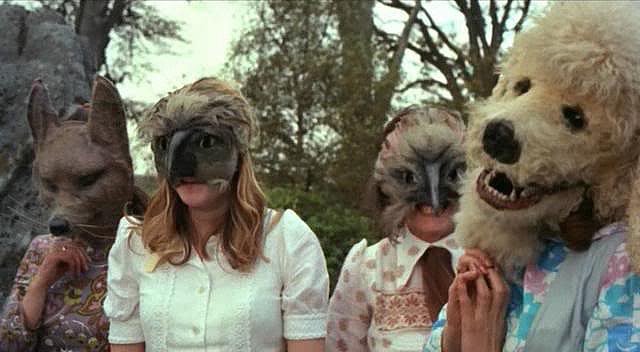It’s September 1st and we’re coming upon on Mabon season. People are starting to plan rituals. Or at least think about planning them.
I have been fortunate to have attended some great Pagan rituals. But, gods know, I have suffered through a lot more rituals that were just terrible. I think most of you probably know what I’m talking about.
I know fellow-Patheos blogger, UU minister and Wiccan priestess, knows what I am talking about. She wrote recently about the contrast between the her own Pagan practice and some CUUPS rituals she had attended, which she describes as “tepid at best, and disorganized and appropriative at worst”, and which, she says, don’t get any more powerful than “writing wishes on flash paper and lighting them from the chalice or, at best, an eight-inch cauldron”.
It’s not just CUUPS though (and to be fair, there are some CUUPS groups that are delving deeper — John Beckett appears to be doing amazing ritual work in Denton CUUPS). I find this mediocrity to be endemic to public Pagan rituals large or small.
For a long while, I have believed that this was due to a lack of training and education in ritual planning and execution. And that’s definitely part of it.
But increasingly, I’m thinking that there is another factor at play … laziness.
Now, I don’t consider myself a great ritual facilitator by any measure. But I have never half-assed a ritual.
Here’s some signs you may be half-assing a ritual:
- A circle is cast and the quarters are called, but the space does not feel sacred. If the quartered circle thing isn’t creating a sense of sacredness, why are you doing it? There’s dozens of ways to create sacred space and time. You don’t need to cast a circle or call the quarters. Find something that works.
- The “highlight” or focus of the ritual is someone walking around the circle giving a homily on the symbolic meaning of the Sabbat. What are we, Protestants? Do we really come to Pagan sabbats to hear a sermon? When it comes to words in ritual, usually less is more. Don’t tell me the meaning of the sabbat — show me! Better yet, help me show myself. Pagan ritual should not be a spectator sport. Crafting this kind of ritual isn’t easy, but it’s worth the investment.
- There is no connection with the immediate environment. For gods’ sake, don’t invoke the element of “water” in the west if there is a large body of real water to the east of you. Take the time to get to know the place where the ritual will be held. Gather plants, fruits, and rocks from your immediate area for an altar or ritual focus. And check the weather. If there is a powerful thunderstorm rolling in, don’t ignore it or treat it like an inconvenience. Make it part of the ritual.
- There is chitchat and casual joking. Humor which is part of the structure of the ritual is fine. (The Feri Pagan Tent Revival at Pantheacon was awesome!) But too often humor is being used to cover for the embarrassment of a bad ritual. Your ritual doesn’t have to be somber, but if people are interrupting part of the ritual to interject unscripted jokes, they’re being disrespectful. You shouldn’t blame them though, because they’re probably taking their cue from your own excessively casual attitude. Treat your ritual with respect and other people will reciprocate.
- People wander in late to the ritual. It’s another sign of disrespect. It shows that people have low expectations — probably based on past experience. If you put the time into planning the ritual, you should expect people to be on time. Show that respect yourself by starting at the scheduled time. It’s okay to have someone at the door to hold latecomers at bay. They’ll be on time next time.
- People are bumping into each other or are waiting in a line to do something. This shows you haven’t thought about the logistics of moving people around. People should be engaged in doing something at every point in the ritual, even if it is just consciously holding space. Standing in lines is the most meaningless of modern activities and has no place in ritual. (Don’t confuse processing in a procession with waiting in line.)
- The ritual facilitators seem lost. Ritual has to be practiced. People have rehearsals for weddings for a reason.
- You’re handing out disposable ritual swag. If you’re going to have people make something as part of the ritual or if you’re going to give them a token of some kind, make it meaningful. Find a way to invest it with meaning. The last thing we need is more meaningless stuff that will end up in the garbage. And FYI, it’s not impossible to invest kiddy crafts with meaning, but it’s really hard.
- The central ritual act is burning a piece of paper with a wish on it. This is so overused! I admit I’ve done variations of this in some rituals, but only if it makes a special kind of sense in that particular ritual. Unfortunately, it’s become near universal in Pagan rituals.
- You start planning a week before the ritual. Self-explanatory.
The picture above is from the 1973 film The Wicker Man. We can debate whether it is a good movie or bad movie (I think it’s so bad it goes out the end, comes back around, and becomes good again). In any case, the ritual at the end is really good — well, you know, except for the homicide part. Notice how none of the signs above are present in the procession or the finale. No one wanders in late to the Wicker Man ritual!
Listen up, fellow ritual planners. I know you’ve conducted over dozens or even hundreds of Wheel of the Year rituals. And I know you feel very comfortable with your old standby formula, but it’s killing us.
All the time, more and more people are being drawn from Neo-Paganism to devotional forms of polytheism. And that’s fine, but you have to wonder why people aren’t finding their home in Neo-Paganism any longer. I think a big part of the reason is that so many of our rituals just suck.
It’s no coincidence that people have started referring to Neo-Paganism as “generic Paganism”: Our rituals fail to connect us to anything larger than ourselves, they fail to communicate with our deeper selves, they they fail to awaken us to mystery and wonder, and they fail to inspire us to action. So, it’s no surprise that people go looking elsewhere for what they need.
Devotional polytheist rituals work because they take themselves seriously and they strive to connect with something beyond themselves. But ritual does not need to be devotional to do this. It need not even invoke deities to be powerful or transformative. But it does need to put us in connection with something bigger than ourselves — whether that be the Earth itself, the wider Cosmos, the community of more-than-human beings, our deeper Selves, or even just one another. Good ritual takes us out of our little isolated egos and expands our souls.
And you can’t do that on the fly!
Your lame quarter calls and your boring Mabon sermon from last year are just not going to get people there.
Let me suggest a radical idea: It’s better to not do a ritual at all than do a bad ritual. If it gets close to time for your Mabon ritual this year, and you don’t really have time to plan the ritual, and you’re tempted to half-ass it … just don’t.
Instead, start planning for your Samhain ritual for later this year. Make it a kick-ass Samhain ritual. And commit to doing a kick-ass Mabon ritual next year.
















